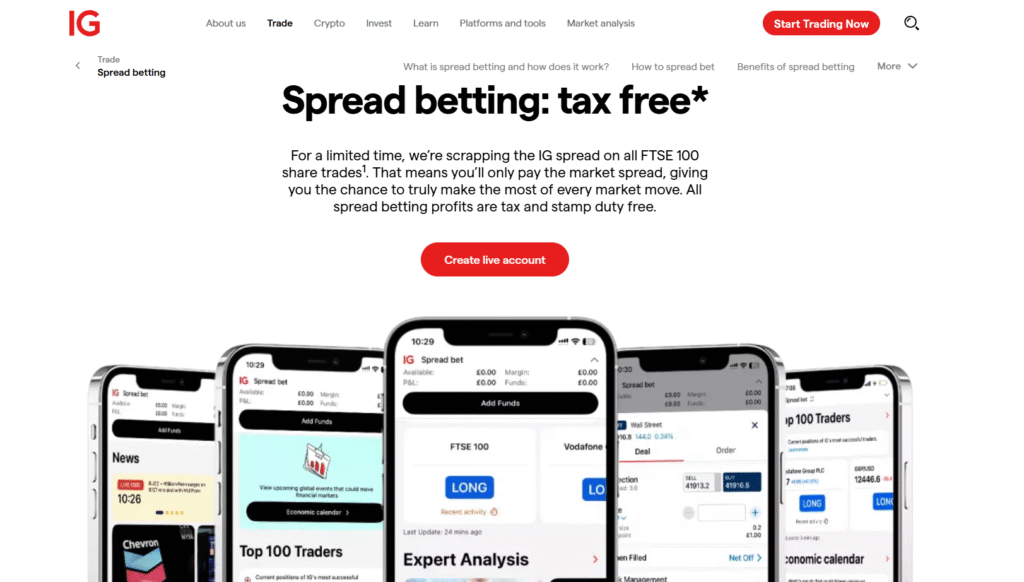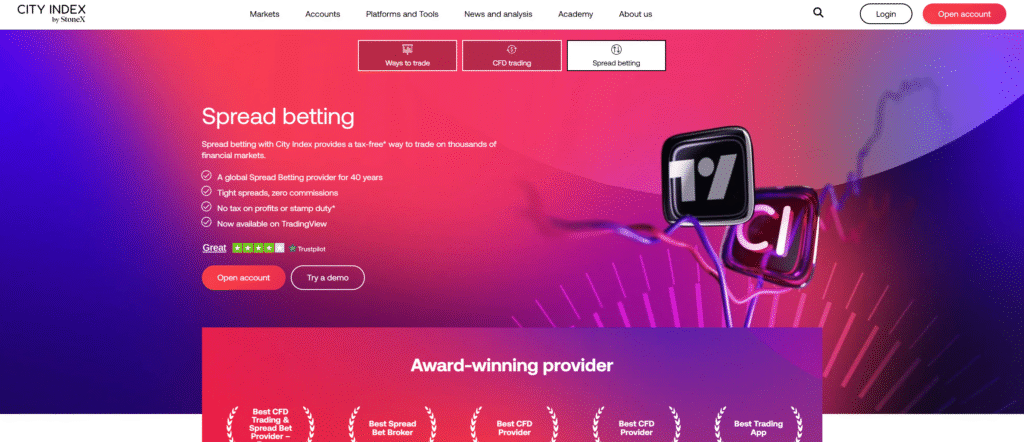Spread betting lets you trade on market movements without owning the asset, making it a flexible and tax-efficient way to speculate on stocks, indices, or forex in the UK.
The best spread betting platforms are FCA-regulated, offer tight spreads, and provide user-friendly trading apps with strong risk management tools.
Always remember, spread betting is high-risk and losses can exceed deposits.
Quick answer: What are the best spread betting platforms in the UK?
In short, the best spread betting platforms in the UK are IG, Spreadex, and Trade Nation. IG stands out for its advanced tools and market depth, Spreadex offers a personalised service and broad market range, while City Index is praised for its transparent fixed spreads and easy-to-use interface. All three are FCA-regulated and trusted by UK traders.
Spread betting broker reviews
1. Spreadex – Overall best spread betting platform UK

What makes Spreadex one of the best spread betting platforms in the UK?
Spreadex is one of the few FCA-regulated UK spread betting brokers offering both financial and sports markets under one roof.
It provides access to 10,000+ markets, including forex, indices, shares, and ETFs, all through a clean, intuitive platform.
Spreadex stands out for its low spreads, personal customer service, and reliability built over two decades in the UK market.
What are the pros and cons of Spreadex?
Pros:
- Excellent customer service and UK-based support
- Tight spreads from 0.9 pips (EUR/USD)
- Reliable and responsive mobile trading app
- FCA regulated with segregated client funds
- Access to financial and sports spread betting
Cons:
- No demo account for beginners
- Limited advanced charting and automated trading
- Smaller range of global markets than larger brokers
What are the fees and spreads like?
Spreadex keeps costs simple and transparent. There are no deposit or inactivity fees, and standard spread bets come with no commission. Overnight financing applies at 3% ± SONIA, and spreads are highly competitive, averaging 0.9 pips on EUR/USD and 1.4 pips on GBP/USD, which beat the industry average across most pairs.
What platforms and features does Spreadex offer?
The Spreadex web platform and mobile app deliver a smooth, reliable experience. Traders can use over 35 technical indicators, set guaranteed stop-loss orders (GSLOs), and access detailed watchlists. The app includes professional tools like Pro Real Trend, VWAP, and multi-timeframe analysis, allowing traders to automate chart patterns and protect positions efficiently.
Is Spreadex safe and FCA regulated?
Yes. Spreadex is authorised and regulated by the Financial Conduct Authority (FCA) and operates from St Albans, UK. Client funds are stored in segregated accounts, ensuring funds remain protected even if the company faces financial difficulty.
Who is Spreadex best for?
Spreadex is best for UK traders who want a secure, low-cost, and straightforward spread betting experience. It suits both beginners, thanks to its clean interface, and experienced traders who value tight spreads, reliable execution, and strong customer support.
Key details
| Feature | Details |
|---|---|
| Average Spread (EUR/USD) | 0.9 pips |
| Minimum Deposit | £0 |
| Markets Available | 10,000+ (forex, indices, shares, ETFs, crypto for professionals) |
| FCA Regulated | Yes |
| Mobile App Rating | 10/10 |
| Overall Score | 96/100 |
Read our Spreadex review.
Risk warning: Spread betting is a high-risk form of trading. 65% of retail investor accounts lose money when trading spread bets and CFDs with this provider.
2. IG

What makes IG one of the best spread betting platforms in the UK?
IG is the market leader in UK spread betting, offering over 17,000 markets across forex, indices, commodities, shares, and ETFs.
Founded in 1974 and listed on the London Stock Exchange, IG combines scale, innovation, and trust. It’s ideal for traders seeking a professional-grade platform, competitive spreads, and access to both short-term and long-term markets, including futures and options.
What are the pros and cons of IG?
Pros:
- Huge market range, with over 17,000 spread betting instruments
- Tight spreads from 0.85 pips (EUR/USD)
- Advanced platforms, including ProRealTime, MetaTrader 4, and IG’s proprietary web suite
- Strong research tools and Autochartist trading signals
- FCA regulated and publicly listed for maximum transparency
Cons:
- Platform can be complex for beginners
- Overnight financing fees on leveraged positions
- Minimum deposit of £250 for new accounts
What are the fees and spreads like?
IG offers tight, transparent spreads starting from 0.85 pips on EUR/USD and 1.4 pips on GBP/USD. There are no direct commissions on spread betting, but overnight financing (2.5% ± SONIA) applies for leveraged trades. Spreads remain highly competitive compared to the industry average, especially on major currency pairs and indices.
What platforms and features does IG offer?
Traders can choose between IG’s proprietary web platform, mobile app, MetaTrader 4, and ProRealTime for advanced charting and automation. IG’s platform integrates Autochartist and PIA First signals, smart order execution, and comprehensive post-trade analytics. Its Signal Centre helps users identify trading opportunities across commodities, forex, and indices — making IG a great fit for both manual and automated strategies.
Is IG safe and FCA regulated?
Yes. IG is authorised and regulated by the Financial Conduct Authority (FCA) and is listed on the London Stock Exchange, giving it one of the strongest transparency profiles of any broker. Client funds are held in segregated accounts, ensuring financial security and compliance with UK investor protection rules.
Who is IG best for?
IG is best for experienced and active traders who want access to global markets, deep liquidity, and professional-grade trading tools. It also appeals to UK investors seeking the trust and stability of a long-established, FCA-regulated, publicly traded firm.
Key details
| Feature | Details |
|---|---|
| Average Spread (EUR/USD) | 0.85 pips |
| Minimum Deposit | £250 |
| Markets Available | 17,000+ (forex, indices, shares, ETFs, options, futures) |
| FCA Regulated | Yes |
| Trading Platforms | IG Platform, ProRealTime, MetaTrader 4, L2 Dealer |
| Overall Score | 86/100 |
Read our IG review.
Risk warning: Spread bets and CFDs are complex instruments and come with a high risk of losing money rapidly due to leverage. 67% of retail investor accounts lose money when trading spread bets and CFDs with this provider.
3. City Index

What makes City Index one of the best spread betting platforms in the UK?
City Index is a top-rated UK spread betting broker known for its fast execution speeds, advanced risk management tools, and TradingView-powered charting. Offering over 13,000 markets, City Index combines professional-grade features with a user-friendly web platform. Backed by StoneX Group, a Fortune 100 company, it’s one of the most trusted and well-established names in UK financial trading.
What are the pros and cons of City Index?
Pros:
- Access to 13,000+ markets, including 84 forex pairs and 4,700 shares
- Guaranteed stop-loss orders (GSLOs) for stronger risk control
- Fast execution speeds under 130ms
- TradingView integration for advanced charting and 100+ indicators
- FCA regulated with a long-standing reputation in the UK
Cons:
- Limited demo account functionality
- Inactivity fees after prolonged periods
- Spread betting only supported via Web Trader platform
What are the fees and spreads like?
City Index offers competitive spreads, starting from 1.4 pips on EUR/USD and 1.5 pips on GBP/USD. Overnight financing applies at 2.5% ± SONIA, with no deposit or withdrawal fees. The broker’s execution speed of 95ms (limit orders) and 131ms (market orders) ranks among the best in the industry, offering a smooth, low-latency trading experience.
What platforms and features does City Index offer?
City Index supports Web Trader, MetaTrader 4, and TradingView. Its Web Trader platform integrates TradingView’s charting tools and Trading Central signals, giving access to over 100 indicators and drawing tools like Fibonacci retracement. The broker’s standout feature is its Performance Analytics, developed from its acquisition of Chasing Returns, which helps traders identify behavioural patterns and improve strategy discipline.
Is City Index safe and FCA regulated?
Yes. City Index is authorised and regulated by the Financial Conduct Authority (FCA) and owned by StoneX Financial Ltd, a publicly listed Fortune 100 company. Client funds are kept in segregated accounts, ensuring protection and compliance with UK financial regulations.
Who is City Index best for?
City Index is best for intermediate and experienced traders who value fast execution, guaranteed stop-loss protection, and data-driven insights. It’s particularly suited for those trading a diverse portfolio of forex, indices, and shares while maintaining tight control over risk.
Key details
| Feature | Details |
|---|---|
| Average Spread (EUR/USD) | 1.4 pips |
| Minimum Deposit | £0 |
| Markets Available | 13,000+ (forex, indices, shares, commodities, options) |
| FCA Regulated | Yes |
| Trading Platforms | Web Trader, MetaTrader 4, TradingView |
| Overall Score | 82/100 |
Risk warning: Spread bets and CFDs are complex instruments and come with a high risk of losing money rapidly due to leverage. 68% of retail investor accounts lose money when trading spread bets and CFDs with this provider.
4. Pepperstone

What makes Pepperstone one of the best spread betting platforms in the UK?
Pepperstone is a fast, FCA-regulated broker built for precision trading. It delivers sub-100ms execution, tight FX and index spreads, and supports MT4, MT5, cTrader, and TradingView. If you value speed, clean pricing, and algorithmic tools, Pepperstone is a standout choice for UK spread bettors.
What are the pros and cons of Pepperstone?
Pros:
- Ultra-fast execution with low latency
- Tight spreads from 0.6 pips (EUR/USD)
- Supports MT4, MT5, cTrader, TradingView
- FCA regulated with segregated client funds
Cons:
- No proprietary platform or GSLOs
- Smaller non-FX market range than multi-asset giants
- Demo access expires
What are the fees and spreads like?
Pepperstone offers very tight spreads on major FX pairs, often from 0.6 pips, with no commission on standard spread bets. Overnight financing applies at 2.5% ± SONIA. Testing shows consistently low costs across pairs, making it attractive for cost-focused and high-frequency traders.
What platforms and features does Pepperstone offer?
You get MT4, MT5, cTrader, and TradingView, ideal for EAs, custom indicators, and advanced charting. Helpful add-ons include Smart Trader Tools for MT4 and Autochartist for automated pattern scanning. Execution speeds averaged 77ms (limit) and 100ms (market) in tests, supporting scalping and algorithmic strategies.
Is Pepperstone safe and FCA regulated?
Yes. Pepperstone is authorised by the FCA and holds client money in segregated accounts. Retail clients have negative balance protection, adding an extra safety layer when trading leveraged products.
Who is Pepperstone best for?
Pepperstone suits active FX traders, algorithmic traders, and scalpers who want fast fills, reliable pricing, and platform flexibility. It is also a strong fit if you prioritise TradingView or MetaTrader workflows on a trusted UK-regulated broker.
Key details
| Feature | Details |
|---|---|
| Average Spread (EUR/USD) | 0.6 pips |
| Minimum Deposit | £0 |
| Markets Available | ~1,200 (strong FX focus, plus indices, shares) |
| FCA Regulated | Yes |
| Trading Platforms | MT4, MT5, cTrader, TradingView |
| Overall Score | 98/100 |
| Overnight Financing | 2.5% ± SONIA |
Read our Pepperstone review.
Risk warning: Spread bets and CFDs are complex instruments and come with a high risk of losing money rapidly due to leverage. 72% of retail investor accounts lose money when trading spread bets and CFDs with this provider.
Regulatory and safety highlights
All platforms listed are FCA-regulated, meeting strict UK standards for trader protection. Client funds are held in segregated accounts and covered by FSCS protection up to £85,000 in case of broker insolvency. Each platform maintains transparent pricing, strong data security, and fair trading practices, ensuring a safe and compliant spread betting environment.
How we test
Each spread betting platform is assessed through a structured process to ensure fairness, safety, and accuracy. Our key testing criteria include:
- Regulation and safety – The broker must be FCA-regulated with segregated client funds and FSCS protection.
- Costs and fees – We compare spreads, commissions, and minimum deposits to find the best value.
- Market access – Platforms are reviewed for the range of tradable assets, including forex, indices, shares, and commodities.
- User experience – We test desktop and mobile platforms for speed, reliability, and ease of use.
- Trading tools and features – Research, analytics, education, and risk management options are evaluated for quality.
- Customer support – Response time, support availability, and service quality are measured.
Only brokers that perform strongly across all areas and deliver a secure, low-cost, and seamless trading experience make our final list.
You can read about how we test platforms here.
This article was reviewed by Tobi Opeyemi Amure, a trading expert and writer at Investopedia, Investing.com, and Trading.biz.
How spread betting works and who it suits
Spread betting lets you speculate on market movements without owning the asset. You bet a set amount per point of movement, for example, a £10 stake per point means a 15-point move earns or loses £150.
You can go long or short, trade indices, forex, shares, or commodities, and enjoy tax-free profits under UK law with an FCA-regulated broker. However, spread betting uses leverage, so losses can exceed deposits.
It suits experienced traders who apply strict risk controls and manage volatility effectively.
What is spread betting and how does it generate profit?
Spread betting lets you speculate on price movements between a market’s buy and sell prices. You stake a set amount per point, and your profit or loss equals the price movement multiplied by your stake. Brokers make money from the spread and small overnight financing fees, making this a low-cost, short-term trading method compared to traditional investing.
How does spread betting differ from buying stocks or forex?
- Ownership: You don’t own the asset or receive dividends — you’re trading on price direction only.
- Capital efficiency: Leverage allows smaller deposits versus paying full share prices.
- Market access: Trade forex, indices, commodities, and shares from one platform.
- Costs: Fees are built into the spread, with no stamp duty or commissions.
- Flexibility: You can go long or short instantly, offering more trading opportunities than stock dealing.
Is spread betting tax-free in the UK?
Yes. In the UK, spread betting profits are exempt from Capital Gains Tax and stamp duty, as trades are classed as speculation, not investment. This tax-free status applies only to individual traders using FCA-regulated brokers. Professional or business-level traders may be taxed differently under HMRC rules.
What to look for in a spread betting broker
Choosing the right broker affects pricing, execution, and fund security. A trusted FCA-regulated platform should offer:
- Functionality: Fast execution, advanced charting, and reliable trading tools.
- Pricing: Tight spreads, clear fees, and transparent reporting.
- Protection: Segregated Tier-1 client accounts and compliance with best-execution standards.
The best brokers also combine deep market access across forex, indices, shares, and commodities with intuitive risk tools, responsive support, and educational resources to help traders improve performance.
Which trading features matter most?
The best spread betting brokers offer fast execution, tight spreads, and access to a wide range of markets. Look for:
- Real-time pricing and advanced charting tools.
- One-click execution with instant order confirmation.
- Risk management tools such as stop-loss, GSLOs, and trailing stops.
- Cross-device access via web, desktop, and mobile platforms.
- Integrated news and sentiment analysis for better decision-making.
Top performers like IG, CMC Markets, and Pepperstone excel in execution speed, reliability, and analytical depth.
How important are spreads, fees, and commissions?
Trading costs directly impact profitability. The spread—the difference between buy and sell prices—is your main expense. Leading UK brokers offer spreads from 0.6 points on indices and 0.7 pips on major forex pairs.
Other costs to check:
- Overnight financing for leveraged positions.
- Currency conversion fees on non-GBP assets.
- Inactivity or withdrawal fees on some accounts.
Understanding how these charges affect your average position size and holding time helps you manage long-term costs effectively.
How to check if a broker is safe and FCA regulated
A safe broker must be authorised by the FCA and follow strict client protection rules, including:
- Segregated Tier-1 bank accounts for client funds.
- Negative balance protection for retail traders.
- Full fee and execution transparency.
- FSCS protection up to £85,000 per client.
Before signing up, always verify the broker’s FCA registration on the official FCA register to confirm authenticity and compliance.
How to manage risk in spread betting
Effective risk management turns spread betting into a structured trading approach. The goal is to control and limit risk, not eliminate it.
Key principles include:
- Position sizing: Risk only 1–2% of total equity per trade to avoid large losses.
- Stop-loss use: Place stops based on market structure, not guesswork.
- Margin discipline: Keep at least 50% free margin to prevent liquidation during volatility.
- Monitoring tools: Use real-time dashboards to track exposure, margin use, and daily P/L.
- Psychological control: Set daily loss caps, take breaks after drawdowns, and track behaviour in a trading journal.
Consistent capital control, automation, and discipline form the foundation of long-term trading success.
What are the risks of leverage?
Leverage amplifies both profits and losses. Even small price moves can wipe out account equity. UK limits cap leverage at 30:1 for forex, 20:1 for indices, and 10:1 for commodities. Over-leveraging remains a leading cause of retail losses, so staying below 50% margin utilisation is crucial for risk control.
How to limit losses using risk tools
Reliable brokers offer built-in tools to protect your capital:
- Stop-loss orders: Automatically close trades at a chosen loss limit.
- Guaranteed stop-loss orders (GSLOs): Lock in an exact exit price for a small premium.
- Trailing stops: Secure profits by following favourable moves.
- Position sizing: Keep trade risk under 1–2% of account value.
- Daily loss limits: Set a maximum daily loss to avoid emotional trading.
Combining these tools with clear risk plans helps manage volatility and preserve trading capital over time.
FAQs
What is the difference between spread betting and CFDs?
Spread betting and CFDs both let you speculate on price movements without owning the asset, but they differ in structure and taxation. Spread betting is classified as gambling in the UK, meaning profits are typically exempt from Capital Gains Tax (CGT). CFDs are financial derivatives, and profits may be subject to CGT. Both are leveraged instruments but CFDs allow fractional exposure and hedging, while spread bets use stake-per-point pricing.
Is spread betting legal in the UK?
Yes. Spread betting is fully legal and regulated under the Financial Conduct Authority (FCA). Only FCA-authorised brokers can offer spread betting services. They must follow strict client fund segregation rules and comply with the Financial Services Compensation Scheme (FSCS) for up to £85,000 in client protection.
Do I have to declare spread betting profits to HMRC?
No. In the UK, profits from spread betting are not subject to Capital Gains Tax or Income Tax for individual traders. However, if trading becomes your primary source of income or you trade professionally, HMRC may classify it differently. Maintaining accurate records is essential in case of any future review.
Can you profit from spread betting?
Yes, but consistent profitability requires skill, risk management, and discipline. Spread betting magnifies both gains and losses due to leverage. Most retail traders lose money because they trade without clear strategies or stop-loss protection. Successful traders apply structured methods and strict position sizing.
Can I spread bet without leverage?
No. All spread bets are leveraged products by design. You control a large position with a smaller margin deposit. However, traders can reduce exposure by using lower stake sizes per point or employing guaranteed stop-loss orders to manage leverage risk effectively.
How are spread bets taxed?
Spread betting is generally tax-free in the UK. You do not pay Capital Gains Tax or Stamp Duty on profits. However, losses cannot be offset against other income. Tax treatment can change, so it’s recommended to stay updated with HMRC guidelines.
How much money do I need to start spread betting?
Most FCA-regulated brokers allow you to start with deposits as low as £100–£250. The exact minimum depends on the asset traded and leverage used. Beginners should start with small position sizes until they understand margin requirements and volatility impact.
Can you spread bet on Bitcoin and cryptocurrencies?
Yes, several UK brokers offer spread betting on Bitcoin and other major cryptocurrencies. These products allow speculation on crypto price movements without owning digital coins. However, leverage limits on crypto are lower (usually 2:1) and volatility is higher than in traditional markets.
What does a +7.5 spread mean?
A +7.5 spread refers to the market’s pricing range where the buy and sell values differ by 7.5 points. In spread betting, the spread defines the broker’s charge for opening and closing positions. Narrower spreads mean lower trading costs and faster breakeven.
Can I hedge with spread betting?
Yes. Spread betting can offset losses in other investments. For example, a trader holding UK equities can open a short FTSE 100 spread bet to hedge against potential declines. Because spread bets are flexible and tax-free, they are often used for tactical portfolio hedging.
Do dividends affect spread betting positions?
Yes, indirectly. When betting on equity markets, dividend adjustments are applied to reflect corporate payouts. Long positions are usually credited, while short positions are debited by the equivalent dividend amount to keep pricing consistent with underlying markets.
Is spread betting the same as day trading?
Not exactly. Day trading is a style of trading focused on short-term opportunities, while spread betting is the instrument used. You can day trade using spread bets, but spread betting can also be used for swing or positional strategies across multiple timeframes.
Why do most people lose money spread betting?
Retail traders often lose due to over-leverage, emotional decision-making, and lack of strategy. FCA data shows that between 65–80% of retail accounts lose money. Structured education, risk control, and realistic expectations are critical for long-term consistency.
Can you spread bet on a forex trading platform?
Yes. Many brokers integrate spread betting with forex platforms like MetaTrader 4 or proprietary systems. This allows users to trade currency pairs using spread bets rather than CFDs, benefiting from tax-free status while maintaining the same analytical and execution tools.





